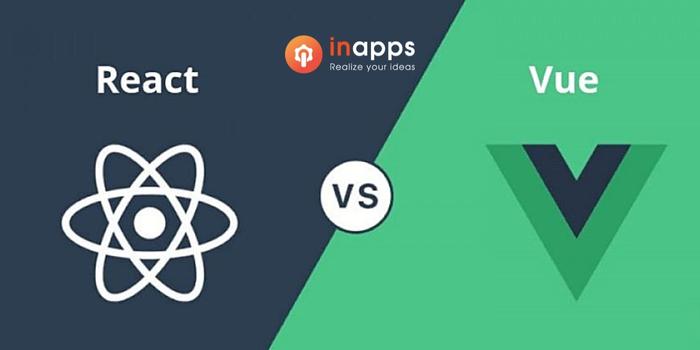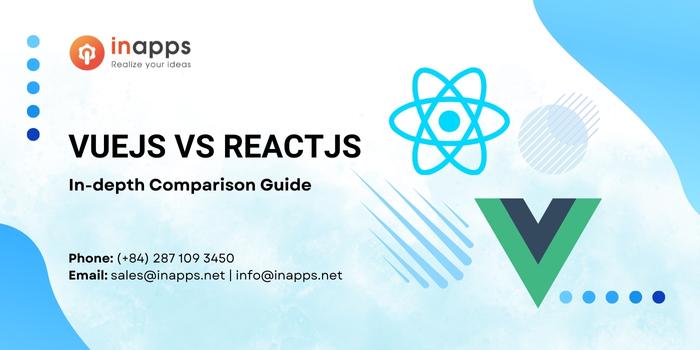Javascript has single-handedly captured the web applications domain by making intelligent use of its frameworks and libraries like VueJS Vs ReactJS. No doubt it is the most useful and popular framework of our times, especially known for providing higher performances and ease of learning.
In addition, both the frameworks are extensively employed for designing the User interfaces and also used for working with the root library. And they have certain similarities too in reactivity, presence of a virtual DOM model, and component-based structure.

Hopefully, this comparison will make you select the best framework for your business challenges and requirements in accordance with your project requirements, the expertise of the developers, market trends, and insights.
VueJs is simpler, it features a lot of concepts from Angular 1 and React. You can use it without any build system — just include it in the HTML file. React is bigger and a little more complex (e.g. in terms of setting up).
JavaScript is undoubtedly one of the most popular languages in the world, and ReactJs and VueJs are the most influential and useful frameworks of this era on whom all the major software developments companies are working. Let’s see this comparison guide to have better clarity in understanding their differences.
Comparing VueJs Vs ReactJs
What Is React?

React is a library for creating reusable and attractive UI components. It is very suitable for components that require frequent data changes.
In React, one can build reusable user interfaces by breaking them into smaller components in place of templates and HTML. It is one of the many Javascript MVC frameworks that are ruling today’s market.
Pros of ReactJs:
- Flexibility and Responsiveness: It offers maximum flexibility and responsiveness.
- Virtual DOM: As it is based on a document object model, it allows the browser-friendly arrangement of documents in HTML, XHTML, or XML format.
- Rich JavaScript Library: Contributors from all over the world are putting in the effort to add even more features.
- Scalability: React has been proven to be better for large-scale apps due to its flexible structure and scalability.
- Constantly Evolving: React is backed by professional developers from Facebook who continuously look for ways to improve it.
- Web or Mobile Platform: React provides the React Native platform which can be used for developing native-rendered apps for iOS and Android through the same React component model.
Cons of ReactJs
Due to the complex setup process, properties, functions, and structure, it requires deep knowledge to build an application.
Companies Using ReactJs:
- Netflix
- New YorkTimes
- Yahoo
- Codecademy
- Dropbox
- Airbnb
- Asana
- Microsoft
What is VueJs

VueJs is an open-source JavaScript framework capable of developing single-page applications. It is used as a web application framework with the aim of simplifying web development. VueJs application development has captured significant attention from developers across the globe in order to build amazing web apps.
VueJs is a progressive framework for building eye-catching UIs for the web. It was released in 2014 by Evan You, a former Google developer who worked on AngularJS and decided to exclude the difficulties of the Angular framework and build something lightweight.
There are many reasons for its popularity but one of the key reasons is its ability to re-render without any action. It allows you to build reusable, small, yet robust components which offer a composable framework that lets you add components whenever required.
Pros of Using VueJs
- Ease-of-Use: Vue.js embraces standard HTML-based templates which make it easier to use and revamp an existing application.
- Smoother Integration: Whether it is a single-page application or complex web interface, Vue.js offers smoother integration of smaller parts without any effect on the whole system.
- Better Performance, Smaller Size: It takes up less space and tends to give better performance than other frameworks.
- Well-written Documentation: It provides an easy learning curve through the detailed documentation and requires no extra knowledge; HTML and JavaScript will get the job done.
- Adaptability: Overall sound design and architecture makes it a popular JavaScript framework. It provides hassle-free migration, simple and efficient structure, and reusable templates.
Cons of Using VueJs
VueJs framework has a small market share in comparison to Angular and React but it is rapidly getting popular because of its super useful features. Also, some issues do come up in terms of large-scale app development when using Vuejs.
VueJs has the potential to achieve milestones in web app development considering its modern features, speed, and flexibility.
In comparison to React, VueJs has fewer downloads and it is mainly popular for building attractive single-page applications and web applications. However, Vue.js features an adaptable architecture which makes it one of the widely used frameworks with up-to-date libraries and packages.
Companies Using Vue.js
- Netflix
- Adobe
- Grammarly
- Behance
- Xiaomi
- Alibaba
- Codeship
- Gitlab
- Laracasts
In-Depth Comparison of Both Frameworks

- Rerendering and Optimization
When you compare React and Vue, speed can’t be a significant comparison factor in deciding which is better.
In terms of performance, its re-rendering feature is a significant differentiator. React’s mechanism triggers the re-rendering of an entire component tree when the component’s state is changed.
To avoid the unnecessary re-rendering of subcomponents, extra features and properties may be used.
Also, VueJs offers optimized re-rendering in which the system keeps track of dependencies during its render and works accordingly.
Rerendering of Vue is the most distinguishing feature which makes it a widely embraced framework by developers across the world.
- Routing and State Management Solutions
In component-based frameworks like React and Vue, you need to pay more attention to the state management and data flow as scaling begun during an application. This is because there are a number of components interacting with each other and sharing data.
In such a scenario, React offers an innovative solution called Flux/Redux architecture which represents unidirectional data flow and an alternative to the famous MVC architecture.
Now, if we consider the Vue.js framework, there’s a more advanced architecture called Vuex which integrates into Vue and offers an unbeatable experience.
React and Vue both have a pretty good development environment. With little or, no configuration one can create apps that get you up and running with the latest practices and templates.
Both of these bootstrap tools tend to give you a comfortable and flexible development environment and a superior starting point to get you started with coding.
- When to Use VueJs Over ReactJs?
Vuejs is better than React when smaller, flexible, and faster applications are required.
When there is a requirement for a lightweight, faster, and modern UI library for crafting a top-notch SPA (single-page application), one must use VueJs. This is beneficial for developers who are used to working with HTML. Also, it provides reusability of the components making web applications create a magical experience for the developers.
- When to Opt for ReactJs Over VueJs?
React Is Better Than Vue.js when there is no requirement to build mobile apps and there is a need to build large-scale applications. React is a lightweight and easy version of migrating, having strong professional community support to solve any issue.
Final Words

Whether ReactJs or VueJs, both frameworks have no major differences, and this decision is completely subjective based on the requirements of your projects.
If you want to integrate a front-end JavaScript framework into an existing application, VueJs is a better choice and when there is a need to build mobile apps with JavaScript, ReactJs is definitely the way to go.
Vuejs and ReactJs are both great tools for building an interactive user interface. Because of its familiar templating syntax and use of components, integrating or migrating existing projects to Vue is faster and smoother. Vue is great for startups but can be just as well used in large-scale applications.
Cross-platform app development is already quite popular and both frameworks are in a race to provide a superior cross-platform app development experience. React’s React Native is a mature and widely used platform for native-rendered apps.
On the other side, Vue’s Weex is still evolving and aims to provide a smooth development experience to create apps for iOS and Android. Keep reading InApps and keep getting updated with informative content like this.
FAQs
- Why VueJS is better than React?
Vue. js and React are both great tools for building interactive user interfaces. … Vue is lightweight, easy to learn, and pleasant to write in. Because of its familiar templating syntax and use of components, integrating or migrating existing projects to Vue is faster and smoother.
- Should I learn Vue or React 2022?
From a development point of view, React will be the best framework to learn in 2022, and then comes Vue, considering the fact that both the JavaScript frameworks are comparatively easy, lightweight, intuitive, and performs flawlessly.
- Does Google use Vue?
Google. Google’s Career Platform, including their job board on careers.google.com is built with Vue. js!
List of Keywords users find our article on Google
[sociallocker id=”2721″]
| vuejs vs react |
| reactjs vs vuejs |
| react vs vuejs |
| offshore vue js company |
| difference between reactjs and vuejs |
| vuejs vs reactjs |
| reactjs or vuejs |
| vue js vs reactjs |
| react js vs vuejs |
| vue js vs react |
| reactjs market share |
| vuejs or reactjs |
| codecademy vuejs |
| why vuejs is better than react |
| vuejs vs |
| what is vuejs |
| react and vue similarities |
| vuejs reactjs |
[/sociallocker]
Let’s create the next big thing together!
Coming together is a beginning. Keeping together is progress. Working together is success.
















